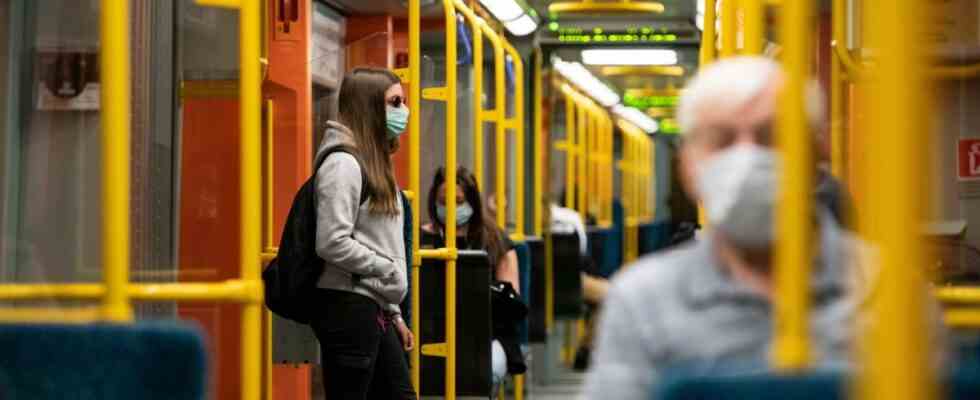Experts are also puzzled as to how the corona pandemic will develop in autumn and winter. But because they cannot rule out a worse situation, the federal government has tightened the protective measures significantly again. In September, the Bundestag and Bundesrat decided, among other things, to extend the mask requirement, possibly also to schools, and to demand more corona tests. If the “functionality of the health system or other critical infrastructure” is endangered in a federal state, it can also issue stricter rules in the future, such as maximum numbers of people at events. All of these new regulations will apply from October 1st to April 7th, 2023.
What applies in detail:
- Nationwide, there is a mask requirement on long-distance trains, as before – there is also an FFP2 mask requirement in doctor’s offices, hospitals and nursing homes. In inpatient facilities such as clinics and homes, there is also an obligation to test, from which newly vaccinated and recovered people are exempt – as well as the patients or nursing home residents in their rooms. These are also exempt from the mask requirement, as are children under the age of six and people who cannot wear a mask for medical reasons.
- The federal states can also make masks compulsory in local public transport. The same applies to indoor spaces open to the public – with a new and crucial exception for people who present a negative corona test, who have either been vaccinated against Corona in the past three months or have recovered from Covid-19 disease: they must be in the Gastronomy as well as leisure, cultural and sports facilities do not wear a mask.
- The federal states can also impose a mask requirement in schools and training institutions, but only from the fifth grade. In schools, daycare centers and facilities such as refugee accommodation or children’s homes, they may in future order compulsory testing.
- If the “functionality of the health system or other critical infrastructure” is specifically endangered, the respective state parliament can decide on further measures: a mask requirement for indoor and outdoor events if the minimum distance of 1.5 meters is not maintained there, mandatory hygiene concepts for all kinds of businesses and events, a mandatory minimum distance in public spaces and also a maximum number of visitors for indoor events. When this specific danger exists is not precisely regulated in the law, only a few indicators such as the number of new infections or the situation in the hospitals are mentioned.
What’s not coming?
The obligation to wear masks on planes, which the federal government had planned, was removed from the draft law at the beginning of September after protests from the industry; should the corona situation worsen, the government could still order it. At the same time, during the deliberations in the Bundestag, the FFP2 mask requirement was also introduced in outpatient medical facilities such as medical practices, day clinics, dialysis facilities and rescue services. Finally, the requirement that children with Covid 19 disease need a medical certificate in order to be able to go back to school was deleted – a negative test will be sufficient in future.
Why did this new rule come about?
The previous regulations in the Infection Protection Act (IfSG) had only allowed a few restrictions – the traffic light coalition decided this in March, mainly under pressure from the FDP. These regulations expired at the end of September. For months, the states urged the federal government to make a successor plan to be prepared for Corona. That is why Justice Minister Marco Buschmann (FDP) and Health Minister Karl Lauterbach (SPD) struggled until the beginning of August. The new regulations are a compromise between the two, which the factions of the traffic light coalition have slightly changed. They are now in effect until April 7, 2023.
How was the compromise justified?
“We will have the situation under control,” no matter how it develops, Lauterbach promised at the final debate in the Bundestag. “We enable the countries to offer exactly what is necessary depending on the pandemic situation – no more, but also no less.” The Minister of Health had advocated stricter measures, but had met with resistance from coalition partner FDP. As his representative, Minister of Justice Buschmann said that the measures were proportionate – and that it was up to the federal states to decide which ones made sense in the respective situation. There will be no further lockdowns, company closures or curfews. And he hopes “that that was the last winter with corona protection measures”.
What has been criticized about the new regulations?
The CDU and CSU think it is right to give the states more tools. But it is wrong not to clearly define when stricter rules will be possible, criticized the CDU health politician Tino Sorge. “You’re making it too easy for yourself,” he accused the government.
Recently, some details were also debated. The representatives of local public transport, for example, were angry that there should still be a mask requirement here, from which airplanes are exempted. Concert organizers feared that upper limits for people would be imposed again for events – that was a “powder keg”. Criticism of the mask rules was also voiced in the countries. The Bavarian Minister of Health Klaus Holetschek (CSU), for example, called this “unrealistic”: Nobody can check in a tavern who has just been tested or not. Lauterbach wants to make this possible with a new version of the Corona warning app.

